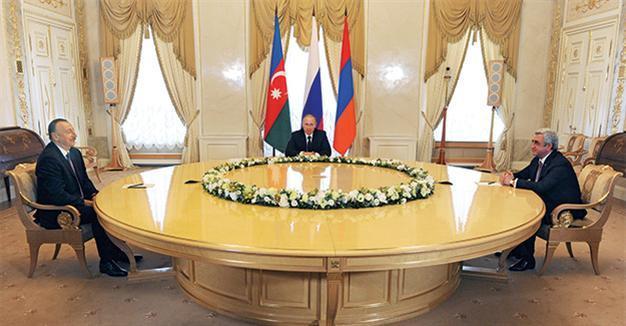Deal ‘in principle’ agreed over Nagorno-Karabakh, says Azerbaijani advisor
BAKU

REUTERS photo
A phased settlement to the conflict in the Nagorno-Karabakh region has been agreed upon “in principal,” said a senior advisor to the Azerbaijani president on June 22.
Novruz Mammadov, the deputy chief of the presidential administration and head of the foreign relations department for the administration of the president of Azerbaijan, said an agreement-in-principle was reached in St. Petersburg on June 20, following talks involving Azerbaijani President Ilham Aliyev and Armenian President Serzh Sargsyan.
“The progressive settlement is, first, the evacuation of Armenian forces from five occupied provinces, then the evacuation from other two provinces [and] the determination of the corridor between Nagorno-Karabakh and Armenia,” Mammadov said at a news conference broadcasted on Azerbaijani TV, according to state-run Anadolu Agency.
“The sides have reached an agreement-in-principle,” he added.
On June 20, the leaders of Azerbaijan and Armenia agreed at a meeting with their Russian counterpart to bolster the number of monitors in the disputed Nagorno-Karabakh region in a bid to shore up a shaky ceasefire.
In a joint statement after the meeting the two sides said they had “agreed in particular to increase the number of international observers in the conflict zone” in order to help strengthen the halt in hostilities, Russian news agencies reported.
At present there are only six unarmed observers from the Organization for Security and Cooperation in Europe (OSCE) deployed in the region to monitor the situation.
Fighting along the volatile frontline of the territory - seized by ethnic-Armenians from Azerbaijan in a brutal war in the early 1990s - flared up in early April, killing at least 110 people from both parties.
A Russian-brokered ceasefire put an end to four days of heavy clashes but tensions remained high as both sides accused the other of breaching the pact.
April’s violence was the bloodiest since an inconclusive truce in 1994 halted the earlier conflict and sparked fears of a return to an all-out war that could pitch regional powers Russia and Turkey against each other.
